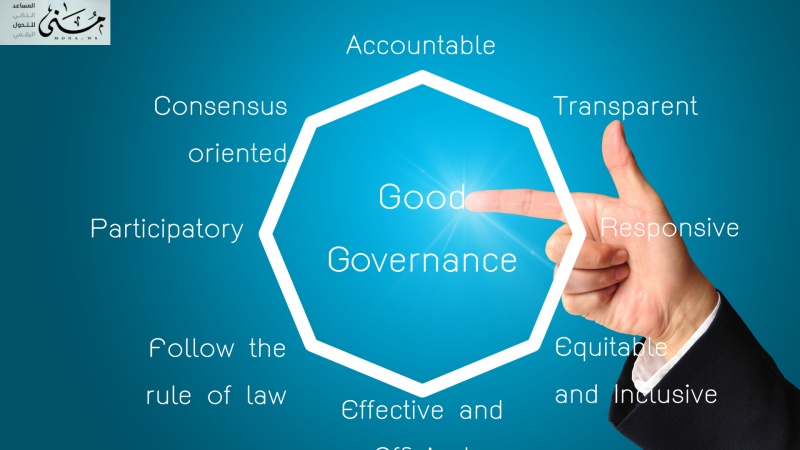Governance in the government sector has become a fundamental necessity to ensure transparency, improve performance, and rationalize the use of resources, especially as the Kingdom of Saudi Arabia moves towards achieving Vision 2030.
You can continue reading the article to learn more about governance in the government sector.
What is governance in the public sector?
The concept of “governance in the government sector” constitutes the basic pillar for ensuring optimal government performance, controlling the relationship between the various state agencies, and promoting the principles of transparency and accountability.
Governance in the government sector refers to a set of systems, laws and procedures that aim to improve the quality of government performance, by organizing the work of government institutions in a way that ensures the achievement of general objectives, while preserving the rights of various parties, whether they are citizens, investors, or regulatory bodies.
The need for governance in the government sector emerged as a result of the challenges faced by countries in the past decades, such as the weak efficiency of government agencies, the absence of transparency, the spread of administrative corruption, and the weak ability to provide high-quality services. Therefore, governance has become a tool for controlling performance and achieving optimal utilization of resources, which contributes to achieving economic and social development.
In the Kingdom of Saudi Arabia, governance in the government sector is of particular importance within the framework of “Vision 2030”, which aims to develop government work, achieve digital transformation, and raise spending efficiency, thus enhancing citizen and investor confidence in government institutions.

Important statistics about governance in the government sector
International reports have shown that countries that apply good governance standards in the government sector achieve high economic growth rates and enjoy greater investor confidence. For example, according to the World Bank 2024 report, countries that topped the Good Governance Index saw a 2.5% increase in GDP compared to countries with weak governance.
In Saudi Arabia, the Transparency International report indicates that the Kingdom’s ranking in the Corruption Perceptions Index has improved over the past five years, advancing from 58th place in 2019 to 52nd place in 2024, reflecting government efforts to enhance integrity and transparency.
The Saudi Ministry of Finance also revealed that implementing governance standards has led to financial savings exceeding 200 billion riyals over the past years, as a result of controlling expenditures and improving oversight mechanisms for government projects.
The development of the governance system in the government sector
Governance systems in the government sector in the Kingdom have witnessed remarkable development over the past decade, as a number of initiatives and support systems have been launched to enhance governance, most notably:
National Transformation Program: Which focuses on raising the efficiency of government work, achieving transparency, and monitoring the performance of government agencies through clear performance indicators.
"Etimad" platform: which aims to automate government financial operations, ensuring control of expenditures and reducing financial violations.
e-Government Procurement System: Which strengthened the principle of fair competition, and reduced the possibility of manipulation of contracts and tenders.
General Auditing Bureau (General Auditing Authority): Which witnessed the development of financial and administrative control mechanisms, with a focus on the use of modern technologies in detecting violations.
These systems have enhanced the concept of governance and made government work a model to be emulated in the region.
Reliable systems to enhance governance
Enhancing governance in the government sector requires the use of advanced technical systems that support the achievement of transparency and provide effective tools for monitoring performance. The most prominent systems that can be relied upon are:
Doc Suite SystemDocSuite):A modern electronic management system that enables monitoring the progress of government work, saving documents and correspondence, and relies on artificial intelligence to analyze data and detect shortcomings, which contributes to enhancing transparency and reducing administrative corruption.
Government Resources System (GRP):It provides integrated solutions for managing budgets, purchases, and salaries, and allows officials to monitor financial performance in real time.
"Marsalat" platform:Which ensures the documentation of all government correspondence, which enhances the principle of accountability, and prevents the concealment or modification of official documents.
Electronic monitoring systems:Such as “smart audit” systems, which rely on big data analysis, to immediately detect any financial or administrative violations.
Challenges Facing Governance in the Government Sector
Despite the remarkable progress, the application of governance standards in the government sector faces a number of challenges, most notably:
Resistance to changeModern systems in government institutions often face implicit rejection from some employees, due to their unwillingness to abandon traditional methods, or their fear of being held accountable when errors are discovered.
Lack of qualified personnelImplementing governance systems requires employees who have sufficient knowledge of modern technologies and the ability to deal with electronic monitoring tools, which represents a challenge in some government agencies.
Poor integration between systemsAlthough there are many electronic systems, their lack of full integration may lead to duplication of operations or loss of some data, which reduces the effectiveness of governance.
BureaucracyThe complexity of procedures in some institutions and the delay in making decisions may hinder the implementation of governance standards at the required speed, and lead to the loss of investment opportunities or the failure to implement projects.
Governance in the government sector is no longer an option, but rather a necessity to achieve sustainable development and enhance citizen and investor confidence in government institutions. The Kingdom of Saudi Arabia has made great strides in this area by launching advanced systems, such as the “Etimad” platform, the “Doc Suite” system, and the “Mursalat” platform, which has contributed to controlling government performance and raising spending efficiency.
However, there is still a need to intensify efforts to address challenges and enhance integration between systems, ensuring full governance and a transparent government work environment that supports the development process and keeps pace with the aspirations of “Vision 2030.”
Governance principles in the government sector
Governance in the government sector is based on a set of basic principles that aim to ensure effective and transparent management of government institutions. The most prominent of these principles are:
TransparencyIt means clarity of government procedures and decisions, and making information available to citizens and stakeholders. This principle enhances trust between the government and the public, and reduces opportunities for corruption.
AccountabilityClearly defining responsibilities within government institutions, so that individuals and entities can be held accountable for their performance and decisions. This ensures that each person or entity is responsible for their duties and is held accountable for negligence.
Rule of law: Commitment of all government agencies and individuals to the applicable laws and regulations, without exception. This principle ensures justice and equality in the application of the law, and prevents the exploitation of power.
ResponseThe ability of government institutions to respond quickly and effectively to the needs and aspirations of citizens, and to provide services efficiently and in a timely manner.
Justice and equality:Ensuring that services and opportunities are provided to all citizens without discrimination, and treating everyone fairly.
Efficiency and effectiveness: Using available resources in the best possible way to achieve the desired goals, and providing services with high quality and at the lowest cost.
Anti-corruptionEstablishing mechanisms and policies that prevent and combat corruption within government institutions, and enhance integrity and honesty at work.
ParticipationEncouraging citizens and stakeholders to participate in the decision-making process, and listening to their opinions and suggestions.
Applying governance principles in the government sector contributes to building strong and reliable government institutions, capable of achieving sustainable development and meeting citizens’ needs efficiently and transparently.
Governance objectives in the public sector
Governance in the government sector seeks to achieve a set of basic objectives that ensure improving government performance and enhancing citizens’ confidence. The most prominent of these objectives of governance in the government sector are:
Protecting public money and achieving transparency
- Implementing policies and procedures that ensure the optimal use of public resources.
- Enhancing citizens’ confidence by providing government information and data in a clear and open manner.
- Compliance with applicable laws and regulations, as well as the facility’s policies.
Enhance performance and efficiency
- Improving government performance by implementing high standards in management and planning.
- Developing processes and reducing waste, which contributes to improving the delivery of public services.
- Identify and classify stakeholders according to their importance and determine mechanisms for communicating with them.
Ensuring accountability and effective oversight
- Establish structures and mechanisms that ensure transparency and provide the necessary means for continuous monitoring and evaluation of performance.
- Implement leading practices in transparency, reporting and auditing to achieve effective accountability.
Improving the quality of decision making
- Develop business organization rules and procedures to promote a culture of engagement, institutional loyalty and empowerment in the organization.
- Effectively manage the relationship with stakeholders, and involve them in the various stages of the administrative process, which enhances their confidence in the announced performance results.
Developing the facility’s capabilities and developing the leadership team
- Sustainable outcome planning enhances the organization’s objectives and develops appropriate performance indicators that reflect the aspects that regulatory bodies want to evaluate government organizations through.
Achieving governance objectives in the government sector contributes to transforming the government sector into a more transparent, effective and responsible environment, which positively reflects on overall performance and citizen satisfaction.
 الحوكمة في القطاع الحكومي لم تعد خيارًا، بل أصبحت ضرورة لتحقيق التنمية المستدامة
الحوكمة في القطاع الحكومي لم تعد خيارًا، بل أصبحت ضرورة لتحقيق التنمية المستدامة










Comments
Add New Comment